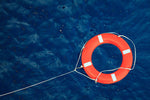
Top 10 Essential Marine Safety Tips for Every Boater
, by Safe Water Team, 2 min reading time

, by Safe Water Team, 2 min reading time
Boating is an incredible way to relax, explore, and enjoy the great outdoors. But whether you’re planning a short afternoon outing or a multi-day voyage, prioritizing safety is non-negotiable. Understanding and applying key safety principles can make all the difference when you're out on the water.
Detailed Safety Tips:
Wear Life Jackets at All Times: Drowning is one of the leading causes of boating fatalities, and most victims were not wearing a life jacket. Always ensure each person onboard has a properly fitted, U.S. Coast Guard-approved life jacket—and wear it.
Check the Weather Before Departure: Sudden storms or high winds can turn a pleasant outing into a dangerous situation. Use apps, NOAA weather reports, and onboard instruments to track real-time weather data.
Maintain Communication Equipment: Carry a VHF marine radio as your primary communication tool. Unlike a cell phone, VHF works reliably offshore. Consider having a backup handheld radio and store your cell phone in a waterproof pouch.
Use Proper Navigation Lights: Proper lighting is vital for visibility in low-light conditions and is required by law. Check that all your navigation lights—port, starboard, stern, and masthead—are working correctly.
Create and Share a Float Plan: A float plan includes your expected route, departure and return times, and contact info. Leave this plan with someone on shore so they can alert authorities if you're overdue.
Keep a Well-Stocked First Aid Kit: Include adhesive bandages, antiseptics, seasickness remedies, and emergency medications. Periodically check and replace expired items.
Avoid Alcohol While Boating: Boating under the influence impairs your ability to react quickly and increases your risk of accidents. Designate a sober captain every trip.
Understand Navigation Rules: Know right-of-way rules, signals, and local boating laws. Ignorance can lead to collisions, legal trouble, or worse.
Check Safety Gear Regularly: Make sure your fire extinguisher is charged and accessible. Test sound-producing devices (horns/whistles) and inspect visual distress signals (flares).
Stay Vigilant and Keep Watch: Always monitor your surroundings, including swimmers, wildlife, and other vessels. Assign a lookout during crowded conditions or when docking.
Conclusion:
Boating safety is not something to take lightly. While the thrill of the open water is alluring, it comes with responsibilities that every boater must uphold. These top ten safety practices are more than just recommendations—they are critical habits that protect lives. Preparation, situational awareness, and a commitment to safety culture aboard your vessel can prevent accidents and ensure that every trip is both memorable and secure. Always stay informed about new regulations, keep your equipment in optimal condition, and lead by example for your crew and guests. Safe boating is smart boating, and your actions set the tone for everyone onboard. Make each journey a safe one.